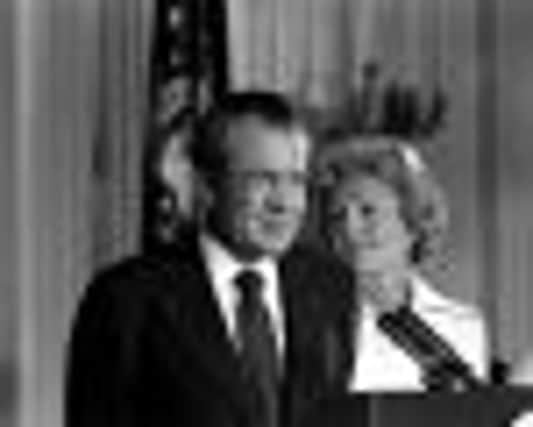Richard Nixon: America’s secret ambassador


Memos and other records showing Nixon’s behind-the-scenes relations with the Clinton White House are part of an exhibit opening today at the Nixon Presidential Library, marking the centennial of his birth.
Mr Clinton has talked often of his gratitude to Mr Nixon for his advice on foreign affairs, particularly in relation to Russia. In a video that will be part of the exhibit, he recalls receiving a letter from the 37th president shortly before his death on 22 April, 1994, at a time when Mr Clinton was assessing US relations “in a world growing ever more interdependent and yet ungovernable”.
Advertisement
Hide AdAdvertisement
Hide AdHe says: “I sought guidance in the example of President Nixon, who came to the presidency at a time in our history when Americans were tempted to say, ‘We’ve had enough of the world’. But President Nixon knew we had to continue to reach out to old friends and to old enemies alike.”
The documents, from February and March 1994, show Mr Nixon, then 81, in the role of elder statesman, two decades after he left the White House in disgrace during Watergate.
Media reports from the time discussed interaction between Nixon and Clinton, including a phone call between them, before the former’s trip to Russia, Ukraine and Germany in March 1994. The records fill in the backstory, detailing Mr Nixon’s advice as well as his willingness to assist US interests abroad.
They include a confidential National Security Council memo from a senior Clinton aide who spent three hours with Mr Nixon, shortly before the former president made his tenth, and final, trip to Russia.
The aide, R Nicholas Burns, writes that Mr Nixon is generally supportive of White House policy on Russia but thinks the administration has not been tough enough when it comes to Russia’s dealings with its neighbours. Mr Nixon advises that US aid to Russia should be linked to American security aims, such as nuclear balance and a reduced threat from the Russian military, rather than emphasising the value of domestic reforms there.
Mr Nixon also offered to carry messages to Mr Yeltsin and others, the memo says.
The documents, released through Mr Clinton’s presidential library, include talking points Mr Clinton apparently used in his call with Mr Nixon.
The trip to Russia was followed closely in the media, in part because Mr Yeltsin froze Mr Nixon out of the Kremlin and took away bodyguards and a limousine the government had provided for him after he met Mr Yeltsin’s adversaries. The Russian president later backed off and urged his officials and parliament members to meet Mr Nixon.
Advertisement
Hide AdAdvertisement
Hide AdIn another glimpse into the relationship between the former US presidents, a handwritten note will be on display from Mr Nixon to Mr Clinton that praises the former Arkansas governor’s 1992 presidential campaign that helped put him in the White House. Mr Nixon said it was one of the best he had ever witnessed. “In enduring that ordeal you have demonstrated that you have the character to lead not just America but the forces of peace and freedom in the world,” Mr Nixon wrote.
In his younger days, Mr Clinton was no fan of Mr Nixon – as a college student in the 1960s, he opposed escalation of the Vietnam War. His wife, Hillary, as a young lawyer, helped draw up impeachment papers against Mr Nixon.
Mr Clinton’s views changed, however, and he led the American nation in paying tribute to Mr Nixon at his funeral in California in April 1994.